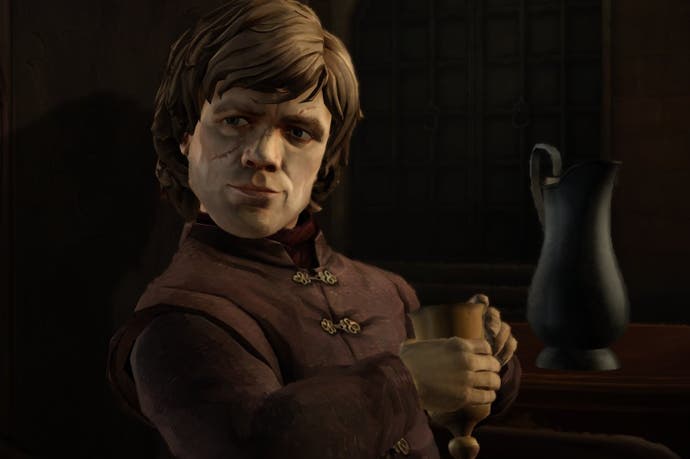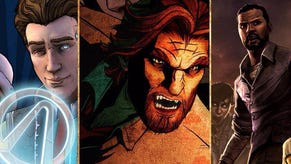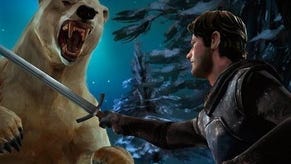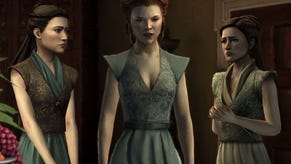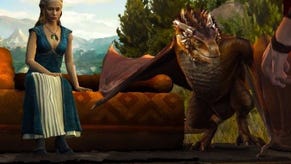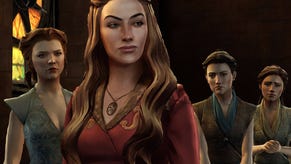Game Of Thrones: Iron from Ice review
“The North will remember that…”
Editor's note: We're taking a different approach to reviews of episodic game series like Game of Thrones, in which the debut episode will be reviewed without a score, as here, and we'll review the whole season with a score at its conclusion.
All things considered, I'm glad I don't have to put a score on Game of Thrones after just this episode. It's a series with potential, and one scene in particular standing out as a blistering reminder of what separates this from your average fantasy tale. At the same time though, it's my least favourite first episode of a Telltale series for quite a while, and the one that most often feels like the company finally biting off more than it can chew.
I want to be wrong about that, and I'm not ruling it out. At its heights, one in particular, this episode shows great promise. It also does, in fairness, have a tougher job than most first episodes. Setting up a story and cast of characters is tricky enough without everything being directly comparable to the most popular fantasy show ever made, and there's a lot of new politics and world building to do before things can really kick off. It's just a shame that it takes almost the entire episode before that happens; two somewhat damp hours.
Timeline-wise, this episode - Iron From Ice - kicks off on the night of a certain Red Wedding. If you have no idea what that means, then a) watch the series, and b) don't Google it. Game of Thrones expects you to know though, as well as be up to speed on everything until at least the end of the third season of the show, with later episodes going up to the end of the fourth series. Houses, characters, terms and plot points come thick and fast, with little in the way of "As you know..." help for people who might not know who, say, Roose Bolton is, or what a Warden of the North does. If you haven't seen the show (or read the books, of course, though this is the TV continuity) you're going to be completely lost as soon as the action starts.
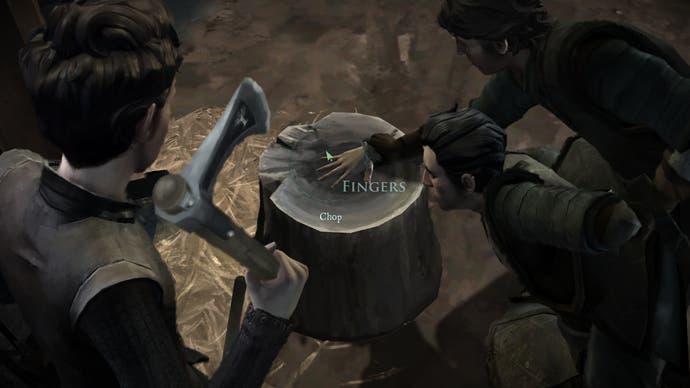
The actual story though takes a step away from the main plot to focus on a new family - House Forrester, the masters of ironwood. There's a casual mention of them in A Dance With Dragons, but otherwise they're a clean slate for Telltale to play with - and it feels like a good choice. They're important enough to be able to go anywhere that the game wants to explore, without feeling shoehorned into the canon. In King's Landing for instance, the viewpoint character isn't a highborn lady who might take afternoon tea with Cersei, but a handmaiden serving Margaery Tyrell. Closer to home, their biggest asset is also their greatest weakness - mastery of ironwood, which everyone wants, but they can no longer properly defend.
Five viewpoint characters are coming in the series, with this episode introducing three. First, as said, is Mira, the eldest daughter of the family, trying to use her position as handmaiden to the future queen to raise royal support. Not easy, since the Forresters are historically bannermen of the Stark family, and so not exactly favoured at court. Second, there's Gared. He starts out as Lord Forrester's squire before the inevitable happens to interupt his master's long and fulfilling life as one of Westeros' more respected Good Eggs, and has to learn the hard way that justice is one of many things a lowborn can't always afford. His tale is a little pedestrian in this episode, largely because his station means he doesn't get much say in it, but it does serve to put him into a much more interesting place for the next few episodes.
Finally, and most importantly, there's Ethan Forrester, a thirdborn son suddenly promoted by bloodied steel to head of the family. Ethan's decisions tend to be the most interesting simply due to his position, both as an immature leader whose respect comes entirely by birthright, and his conflict over what kind of leader he both wants and needs to be in a time of war. Faced with a thief for instance, there are three options - to cut off three fingers as a warning to others, to send the man to the Wall while his family starves, or show mercy. Unlike many Telltale decisions of the past, none jump out as inherently right or wrong, even if he ends up wielding the axe personally. To show mercy for instance is also to show weakness, which can't be allowed. To lose the support of the people however would also be to lose everything.
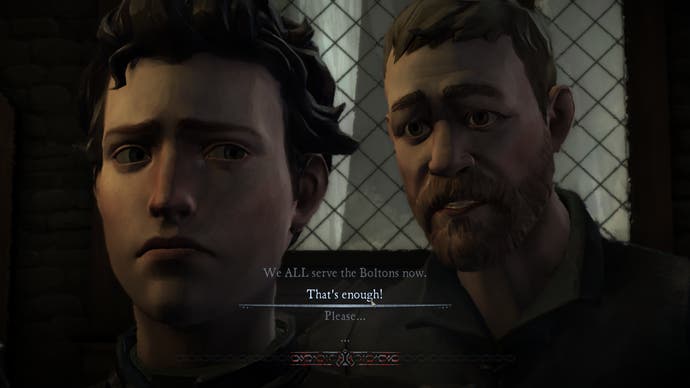
All these pieces are well chosen and the story set-up is strong, as well as helped immeasurably by members of the TV cast (we can now officially declare Peter Dinklage better in front of a camera than a microphone, but he's much better than in Destiny) alongside newcomers of - being charitable - rather variable quality. The big decisions are well implemented. Everything flows along at a decent clip. On the surface, all is well, if you ignore the unfortunate graphics that make the TV characters especially look as convincing as Spitting Image dolls who just discovered Botox.
Even with its problems, Game of Thrones is a perfectly solid game - provided you don't object to Telltale's current format of QTEs, timed conversations, "X will remember that" decisions and only occasionally being let off the leash to poke around at your own pace. Much like its old designs' obsession with Three Trials design, it's getting old now and in need of the kind of shake up that The Walking Dead originally provided. Still, it should come as no surprise, and both it and its focus on dialogue over puzzles suits Game of Thrones just fine. It often feels like amateur theatre next to the HBO original, but just about anything would.
The irk is something more subtle; not that anything is disastrously wrong, but that it doesn't feel right, especially coming to Game of Thrones straight from last week's far more enjoyable Tales From The Borderlands. It's best described like this - that game, like The Walking Dead before it, was designed to play to Telltale's strengths. It compensated for its limited looks with cinema and heart, its decisions were immediately fun, and it was separate enough from the Borderlands we know to allow for its writers' voices to merge with the material and create something new and fresh. Instead of Telltale and Gearbox's distinct house styles and formats clashing, their strengths ended up sitting comfortably as two sides of the same coin.
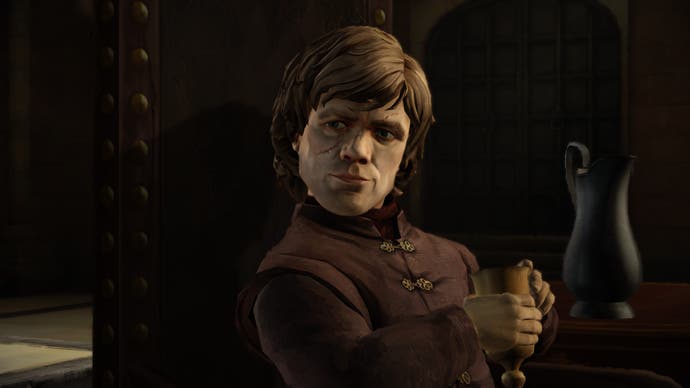
Game of Thrones meanwhile feels more like Telltale struggling with its weaknesses, from its relatively primitive 3D characters having to mirror drama and violence that live-action does far better, to its recurring problem of trying to hammer every license into its one-size-fits-all style. One recurring thing for instance is that the characters often come across as far too casual, to the point of sounding more at home in something like Dragon Age than Westeros.
The ongoing dissonance, along with the production issues, quickly make this more a game trying to be Game of Thrones than one that succeeds at being it, or setting itself far enough apart to be treated as its own thing. As much as it makes commercial sense for it to be based on the TV show, it's hard to not wish it could have been a new interpretation of the books rather than trying to shoot for the impossible.
That being said, the moments where it does land a home run are superb. Much of the episode is spent with the Forresters dreading a visit by Ramsay Snow, knowing as well as we do he's going to steal the show with his giddy sadism. He absolutely does, and both the staging and psychological battering they take hint at some really powerful conflicts later on. Elsewhere, while it remains to be seen how much the choices ultimately pay off, the big ones are well chosen and meaningful enough to be worth considering for as long as the timer allows. Ethan for instance has to choose between two very different men as his effective second-in-command - one a military man ideally suited for a war, the other a wiser one who might find alternatives. Mira meanwhile is torn three ways between her family, her mistress, and the crown, all of whom expect both loyalty and political savvy.
Somewhat similarly, I feel torn here. I can't say I enjoyed this episode very much, but not to the point that I can't see things picking up now that things are properly in motion or that looking back it won't be the foundation the series needed. Telltale absolutely has it in them to create a dark, dramatic story worthy of the license, and I'd love to see them pull it off. For now though, I'd suggest holding back for an episode or two to see how things look once at least our trivial little winter has come and gone.
